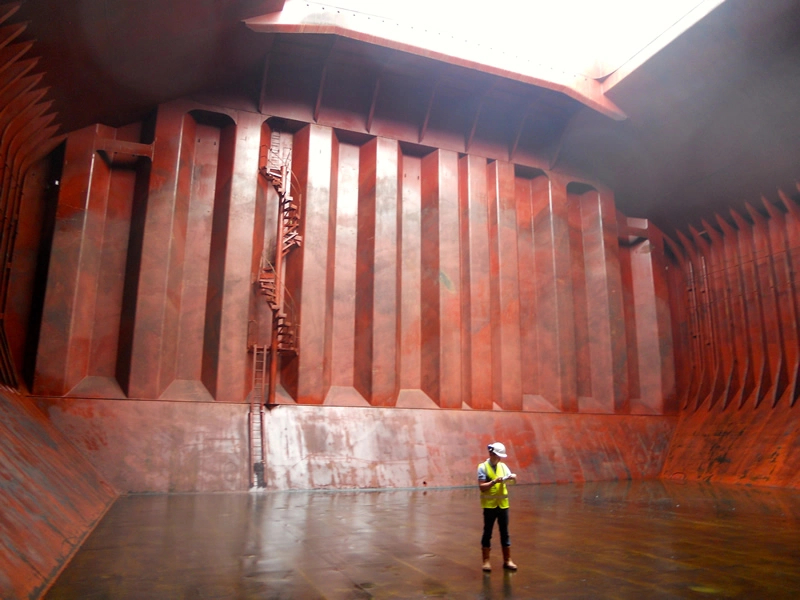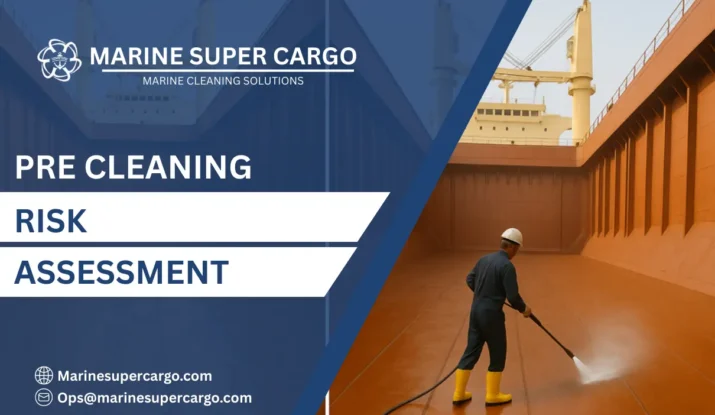Pre cleaning risk assessment represents the fundamental safety foundation for all bulk carrier hold cleaning operations worldwide. These critical evaluations identify potential hazards and establish comprehensive safety protocols before commencing decontamination procedures. Understanding pre cleaning risk assessment requirements is essential for preventing accidents and ensuring regulatory compliance throughout vessel operations.
The systematic approach of pre cleaning risk assessment protects personnel and equipment from bow to stern cargo hold operations. These detailed evaluations examine atmospheric conditions, structural integrity, and contamination levels throughout vessel spaces. Pre cleaning risk assessment procedures must address varying hazard scenarios across port and starboard compartments before cleaning operations begin.
Pre cleaning risk assessment protocols identify immediate safety threats and long-term operational risks throughout bulk carrier cargo spaces. The comprehensive nature of these evaluations ensures proper safety protocol implementation and emergency response preparation. Forward holds near the forecastle require particular attention during pre cleaning risk assessment due to ventilation limitations and structural complexity.
READ MORE: Pre-Washing Hold Sweeping Fujairah
Comprehensive Hazard Identification Protocols
Pre cleaning risk assessment involves detailed analysis of atmospheric conditions, chemical contamination, and structural hazards throughout bulk carrier cargo holds. These evaluations identify toxic gas concentrations, oxygen deficiency, and explosive atmosphere potential before personnel entry. Atmospheric monitoring equipment detects dangerous conditions that require specialized ventilation and safety protocols.
The systematic approach of pre cleaning risk assessment examines contamination patterns from previous cargo operations throughout vessel compartments. Port-side holds often display different hazard characteristics due to loading equipment positioning and environmental exposure. Starboard sections may present varying contamination levels based on discharge procedures and atmospheric conditions.
Structural integrity evaluation during pre cleaning risk assessment identifies potential safety hazards including damaged coatings, corroded surfaces, and compromised ventilation systems. Aft cargo areas near machinery spaces require particular attention due to elevated temperatures and vibration effects. These comprehensive evaluations ensure safe working conditions throughout all vessel operations.
MARPOL and IMO Safety Regulatory Framework
The International Maritime Organization (IMO) establishes comprehensive guidelines for safety assessment protocols and hazard identification requirements in marine operations. MARPOL regulations mandate proper risk evaluation procedures for all cargo hold cleaning operations.
Pre cleaning risk assessment must comply with international safety standards for confined space entry and hazardous material exposure prevention. All assessment procedures require certified personnel and calibrated monitoring equipment. The IMO mandates detailed documentation of safety evaluations and emergency response preparation protocols.
International safety regulations require continuous monitoring and risk reassessment throughout pre cleaning risk assessment operations. Vessel operators must maintain comprehensive safety databases and emergency response capabilities for hazardous scenarios. MARPOL compliance demands certified safety assessment procedures and proper documentation protocols.

Professional Assessment Services by Marine Super Cargo
Marine Super Cargo specializes in comprehensive pre cleaning risk assessment through advanced monitoring technologies and certified safety specialists. Our experienced assessment teams understand complex hazard identification requirements and maintain strict adherence to international safety standards throughout all evaluations.
Our systematic approach includes detailed atmospheric monitoring, structural integrity evaluation, and contamination analysis throughout all cargo hold operations. We utilize specialized detection equipment and comprehensive assessment protocols designed for pre cleaning risk assessment requirements. Our teams coordinate closely with vessel crews to ensure complete safety protocol implementation.
Marine Super Cargo employs certified safety specialists who understand the complex requirements for hazardous cargo hold assessment operations. We maintain emergency response protocols and specialized safety equipment throughout all evaluation activities. Our safety-first approach ensures regulatory compliance while achieving thorough pre cleaning risk assessment objectives.
Atmospheric Monitoring and Safety Protocols
Bulk carriers require comprehensive atmospheric evaluation during pre cleaning risk assessment to identify toxic gas concentrations and oxygen deficiency conditions. These critical measurements determine appropriate ventilation requirements and personnel protection protocols. Continuous monitoring systems detect dangerous atmosphere changes throughout assessment operations.
Forward cargo holds often present unique atmospheric challenges during pre cleaning risk assessment due to ventilation effectiveness and contamination accumulation patterns. Aft compartments near engine room areas may experience different atmospheric conditions requiring specialized monitoring approaches. Professional assessment protocols address varying environmental conditions throughout vessel cargo spaces.
Specialized safety equipment deployment follows pre cleaning risk assessment findings to ensure personnel protection and operational safety. Emergency response teams must be immediately available throughout all assessment activities. Comprehensive atmospheric monitoring prevents exposure incidents while establishing baseline safety conditions for cleaning operations.
Contamination Analysis and Hazard Classification
Pre cleaning risk assessment requires detailed contamination analysis to identify chemical residues and determine appropriate cleaning protocols. Different cargo materials leave specific contamination signatures requiring specialized detection and neutralization procedures. These evaluations guide proper safety equipment selection and decontamination strategies.
Previous cargo analysis during pre cleaning risk assessment determines potential interaction hazards and cleaning agent compatibility throughout vessel operations. Chemical residue identification enables proper risk classification and safety protocol development. Specialized testing equipment detects trace contamination levels that standard procedures might overlook.
Marine Super Cargo provides comprehensive contamination analysis services designed to identify specific hazard scenarios. Our services include chemical detection equipment, residue analysis protocols, and specialized safety planning for pre cleaning risk assessment operations throughout bulk carrier facilities.
Emergency Response and Safety Planning
Modern pre cleaning risk assessment emphasizes comprehensive emergency response planning and safety protocol development for potential hazard scenarios. Emergency evacuation procedures must be established before personnel entry into cargo holds. Medical response capabilities ensure immediate treatment availability for exposure incidents.
Safety planning protocols must address potential equipment failures, atmospheric changes, and emergency evacuation requirements during pre cleaning risk assessment operations. Communication systems ensure continuous contact between assessment teams and emergency response personnel. Specialized rescue equipment remains immediately available throughout all evaluation activities.
International safety regulations demand comprehensive emergency response preparation during pre cleaning risk assessment procedures. Marine Super Cargo facilitates emergency planning through specialized safety management systems that ensure personnel protection and regulatory compliance throughout vessel operations.
Documentation and Compliance Management
Pre cleaning risk assessment requires detailed documentation of all safety findings, atmospheric conditions, and hazard classifications for regulatory compliance. These comprehensive records guide cleaning protocol development and emergency response planning. Proper documentation ensures MARPOL compliance while maintaining operational transparency.
Safety assessment records must include atmospheric readings, contamination analysis results, and recommended safety protocols for all cargo hold areas. Pre cleaning risk assessment documentation provides essential information for cleaning contractors and vessel operators throughout decontamination operations.
Frequently Asked Questions
Q1: What atmospheric conditions are evaluated during pre cleaning risk assessment?
A: Assessments measure oxygen levels, toxic gas concentrations, explosive atmosphere potential, humidity, temperature, and ventilation effectiveness throughout all cargo hold compartments.
Q2: How long does a comprehensive pre cleaning risk assessment require?
A: Assessment duration depends on vessel size and contamination complexity, typically requiring 4-12 hours for complete evaluation of all cargo holds and safety protocol development.
Q3: What specialized equipment is needed for proper risk assessment?
A: Atmospheric monitoring devices, chemical detection instruments, structural inspection tools, communication systems, emergency rescue equipment, and certified calibration standards are essential.
Q4: How does MARPOL regulate pre cleaning safety assessments?
A: MARPOL mandates comprehensive safety evaluations, proper documentation, certified personnel, emergency response planning, and continuous monitoring throughout all cargo hold operations.
Q5: What emergency preparations are required during risk assessments?
A: Emergency response teams, medical support, rescue equipment, evacuation procedures, communication systems, and immediate treatment capabilities must be available throughout assessment operations.
For professional bulk carrier pre cleaning risk assessment services, contact Marine Super Cargo today. Our certified safety specialists ensure comprehensive hazard identification while maintaining MARPOL compliance and operational excellence.


